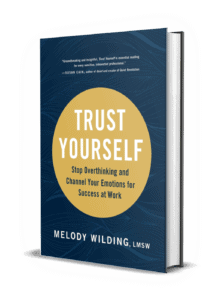We all know life has its challenges and setbacks. The 21st century brings us smaller workforces, more responsibility, and expectations from others 24/7. Doing the work of two or more people, the phone that never stops ringing and the boss who gives you something she needs yesterday can frustrate anyone. This pressure can knock you off focus and test your will, but you don’t have to let it discourage you.
Achieving success requires risks – lots of them. Studies have shown that those who rise to the top have emotional courage, or a willingness to persist in the face of regularly hearing “no”. Pushing through the rejection, criticism, and disappointment can toughen us.
Teddy Roosevelt once said about his days in the wild: “There were all kinds of things I was afraid of at first… but by acting as if I was not afraid I gradually ceased to be afraid”. Courageous people see challenges as opportunities to grow.
Reconnecting with the determination that’s helped you succeed takes re-examining your strengths and a little creativity. When challenging scenarios have you hanging your head, shore up your confidence with these skills so you can get back up, dust yourself off and look the challenge in the eye to overcome.
What to Do When: You Have Too Many Simultaneous Priorities
The more successful we are, the more this becomes an issue. Demands come from multiple directions, and somehow they all are the “most important” one right now. Feeling spread thin can wear on your focus.
When there are too many priorities, ask yourself:
- Which tasks most closely align with my goals?
- Which ones have the greatest consequence if not accomplished?
- Are my expectations for each priority realistic?
- Is there any flexibility I’m not acknowledging?
- Does everything have to be done perfectly? (spoiler alert: no.)
Having inflexible expectations of short-term goals can harm productivity and hold you back. Re-evaluating each finish line can help sharpen focus on which priorities really do outweigh the others, allowing you to put momentum where it’s needed.
Once you’ve determined what’s most important of all the “critical” tasks, be decisive. Your re-evaluation helped you clarify your reasoning, so now you can communicate to the naysayers what needs to be done and why. Keeping your justifications and long-term vision in mind will inject the energy needed to keep your determination strong.
What to Do When: People Aren’t Meeting Your Expectations
You know what you want to accomplish and how you want to do it. You also know those achieving results requires collaboration from others. Determined people find ways to get their needs met, recognizing that they can support and influence other people – not control them.
Evaluating your expectations and communicating them clearly can lead to elevating performance, rather than exasperation. If someone’s performance isn’t up to par, don’t neglect them. Address the situation curiously and assertively. Check for understanding. Re-evaluate the action plan. It may be a matter of assigning the right task to the right person on the right timeline. Don’t swoop in to fix the situation yourself. Get commitments from your team about what will be done, letting them know you’re there for support.
Taking another person’s viewpoint into account may require flexibility on your part, as does considering other avenues to meet your objectives. But when you’re open and adaptable, you might discover a better way to accomplish what you’re after, revitalize projects and your determination as a result.
What to Do When: Your Personal Life is Suffering
High achievers tend to over-function at work, only to find there isn’t enough time or energy left for family or personal life. When we over-function in one area of our life, we take on more than our share of responsibilities, strive for unreasonable standards, and drive ourselves to exhaustion doing it. Luckily there are things you can do to regain needed balance and find a more appropriate level of commitment that leaves something left for you and your life outside of work.
Are you conscientious at work or “hyper-conscientious”?
Focusing on details, timeliness and the team’s goals is an asset in the workplace, but taken too far, it can be detrimental for well-being. Research has found that those at the extreme end of conscientiousness take a bigger hit emotionally when things don’t go well in their careers. Those who identify too heavily with work and put too much emphasis on success, end up depleting time and energy needed for self-care and relationships. Redirecting some of that conscientiousness toward your personal life can provide an emotional buffer for the times when work stress hits a fever pitch. Better emotional resilience will help maintain your focus and keep your resolve intact on the bad days.
When you are at work, you probably give your tasks undivided attention. But if you let those boundaries slip when you’re at home, then work can bleed into your personal life. Whether it be extra time on the computer, jotting notes down, or making phone calls when you’re off the clock, poor boundaries can lead to overworking that runs you down.
Practice mindful awareness and staying in the moment instead of letting yourself get taken by work-related distractions. Channel your attention to what and who is in front of you in the here and now. Studies have shown that people who attend fully to the present moment without judgment and with curiosity function better in relationships. And when you’re recharged emotionally and mentally, you can deliver your full vigor at work during times when it matters the most.
Determination in the face of obstacles, challenges, and disappointments doesn’t have to be elusive. Even on the most difficult of days, you can use your skills and experience to find new ways to work around, through, and beyond what’s dragging you down and bring new life to your work and home life.
Want to Learn More? Check Out My LinkedIn Learning Course
This course summarizes tools and strategies I’ve used over the past ten years with coaching clients at companies like Google, Amazon, and more.
Why you measure your worth with your work from Managing Your Emotional Response to Workplace Stress by Melody Wilding, LMSW
We spend approximately 70 percent of our lives at work. It’s no wonder, then, why our careers are a defining aspect of our identities. The risk is in becoming too emotionally invested in your work.
That’s why in this Linkedin Learning course, Managing Your Emotional Response to Workplace Stress, you’ll gain:
- Tools to separate your self-worth from your career
- Techniques to build greater confidence and work-life balance
- Skills to regulate your emotions and be less reactive to setbacks
- Methods and mindsets to take feedback and criticism less personally
Start the course now for free with LinkedIn Premium or sign up for just $24.99.
Some of the links contained in this article are affiliate links. This means that I may receive a commission if you click on the link and make a purchase from the affiliate.









